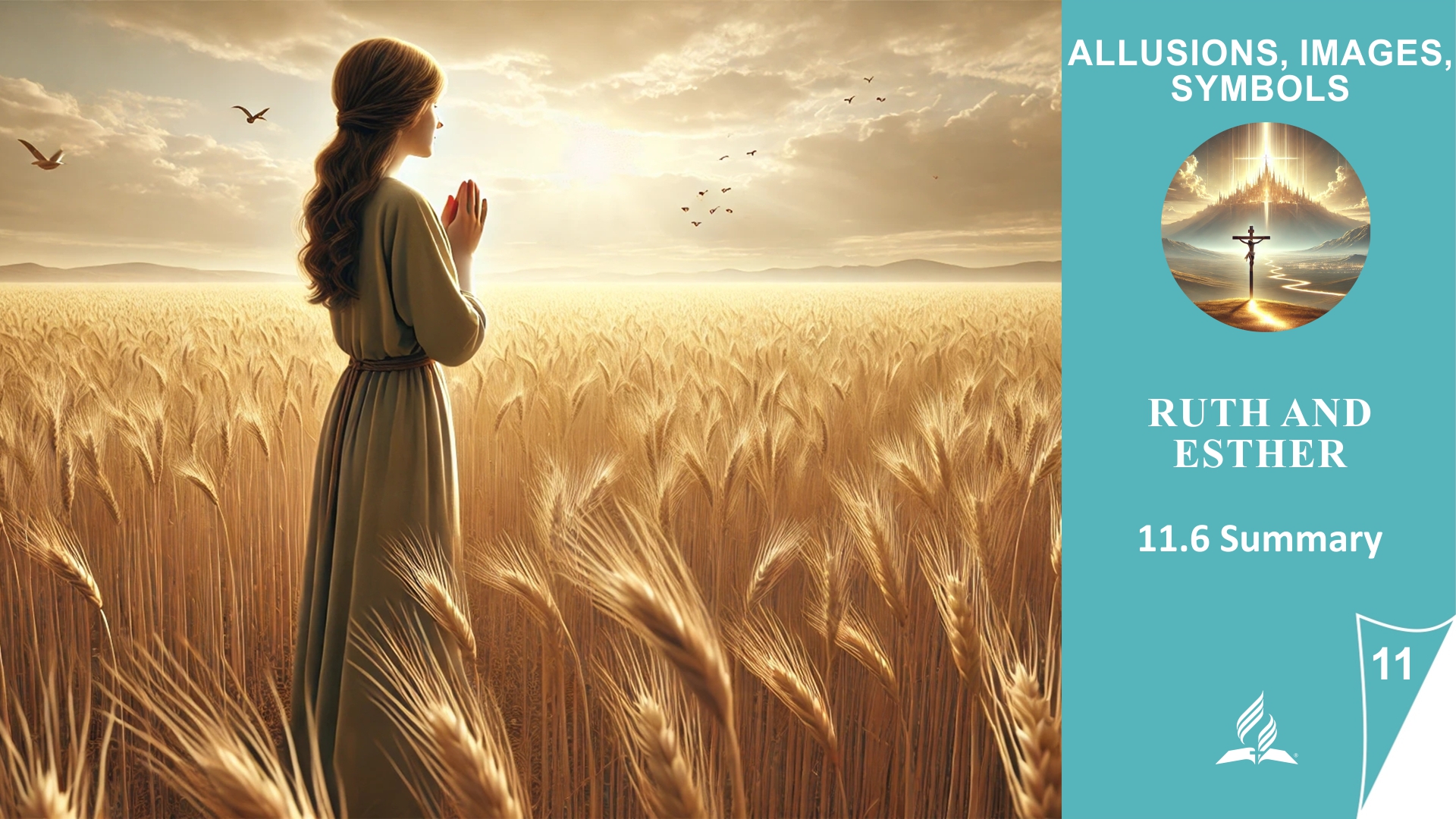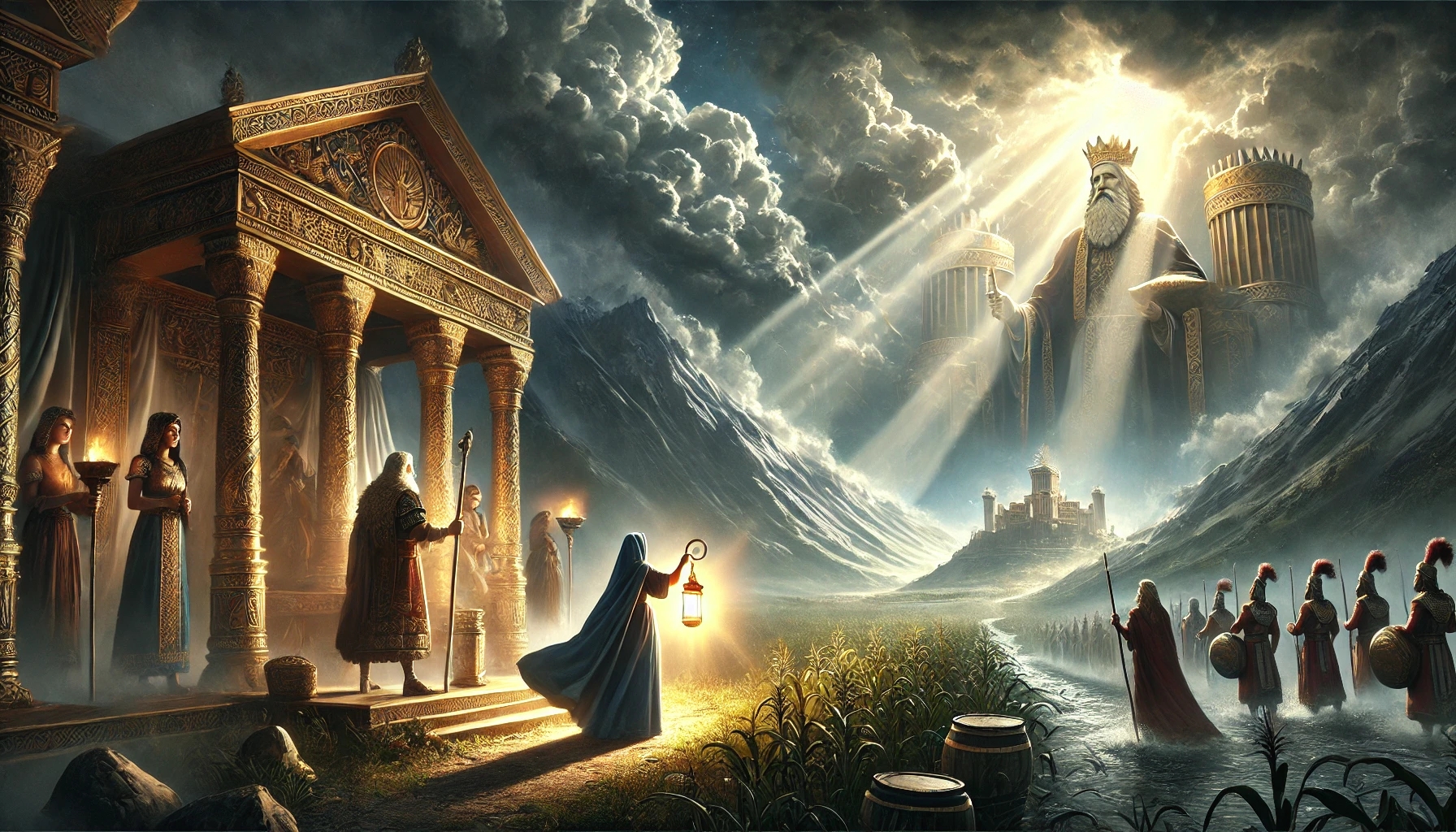


⛪ Lesson 11: Ruth and Esther
📘 11.6 Summary
✨ God’s Saving Hand in the Great Controversy
………………………………………………………………….
🟦 Introduction
When we read the stories of Ruth and Esther, we see how God writes history not only through spectacular revelations, but also through completely ordinary people. These biblical women lived in times of crisis—far from home, threatened by loss or death—and yet they became key figures in God’s plan of deliverance. Their life stories are not ancient fairy tales but prophetic reflections of our own lives in the 21st century.
Today’s world is full of uncertainty, division, and threat—politically, morally, ecologically. And yet the same question arises as in Mordecai’s day: “Who knows whether you have not come to your position for such a time as this?” Right here, right now. Where you live, work, and pray. Even today, God is looking for people who will carry light into the darkness—like Ruth in the field, like Esther before the throne.
………………………………………………………………….
📖 Key Content at a Glance
11.1 Famine in the “House of Bread” – Ruth 1
→ God’s presence even in adversity: Even in times of scarcity and loss, God remains faithful.
11.2 Ruth and Boaz – Ruth 2–3
→ Boaz as a symbol of Christ: God’s provision and love come through someone who enters our life.
11.3 Boaz the Redeemer – Ruth 4
→ The great exchange: Boaz redeems the inheritance—symbolizing Christ’s redemptive work on the cross.
11.4 Haman and Satan – Esther 3–7
→ Haman as a type of Satan: Pride, manipulation, and deception—yet unmasked and defeated.
11.5 For Such a Time as This – Esther 4–9
→ Esther’s calling as a model: Courage, fasting, prayer—and trust that God will act for His people.
………………………………………………………………….
✨ Spiritual Principles
✅ God’s providence may not be visible—but it is effective. In suffering and loss, God remains near. His plan does not fail, even when we do not see it.
✅ Calling happens in the everyday. Ruth gathered grain. Esther prepared for a dangerous encounter. Both served faithfully in the small—and were used greatly.
✅ True redemption costs something. Boaz paid the price. Esther risked her life. Christ went to the cross. Those who love do not remain neutral.
✅ Satan lays claim—but Christ is the true heir. Just as Boaz bypasses the “closer relative,” Jesus overrides the enemy’s demands.
✅ Prayer and fasting prepare for spiritual battles. Courage rarely comes from the gut—it grows in quiet prayer.
✅ The past strengthens faith for tomorrow. Purim was instituted to remember God’s deliverance. Remembering is spiritual resistance against fear.
………………………………………………………………….
🧩 Application for Daily Life
Ask yourself each morning: What if I am meant to be a light today—right where I am?
→ Say this prayer: “Lord, place me where I am needed today—even if I’m afraid.”
Stay courageous—even in small things.
→ Confront lies with truth. Listen where others judge. Show mercy where injustice reigns.
Fast intentionally.
→ Give up your phone, the news, or noise for a day—to hear God’s voice.
Keep a rescue journal.
→ Note every time you experience God’s help—for the days when you start to doubt.
Be a Boaz or Esther to others.
→ Ask in your church if someone needs support—in prayer, conversation, or practical help.
………………………………………………………………….
✅ Conclusion
The stories of Ruth and Esther are testimonies of God’s faithfulness in the shadow of the unseen. Of deliverance brought through people who didn’t choose their roles—but said yes. Their journeys through darkness and decision, loss and courage, reflect our own battle: To whom do we belong? Whom do we follow? What do we stand for?
God does not call us to comfortable safety, but to committed faith. Those who keep their eyes on Christ will see every trial as an opportunity to be faithful—for such a time as this.
………………………………………………………………….
💭 Thought of the Day
You are not where you are by accident. It may look like coincidence—bad luck, human failure. But perhaps God chose this very place, this very time, and your very voice to make hope visible. Be ready. He wants to use you.
………………………………………………………………….
✍️ Illustration – “Between the Lines” – A Story of Calling, Courage, and Quiet Miracles
Berlin, Present Day
Lina pushed the subway door open with her foot, balancing her coffee and overstuffed bag as she squeezed into the crowded train car. Rain clung to her hair, her mind on the meeting scheduled for 9 a.m. It was one of those days when she wondered if any of it really mattered. For six years she had worked as a policy adviser at the Ministry of Education, pushing papers, drafting proposals that rarely got read.
“You have so much potential,” her professor once said. “God will use you.”
But how? Between budgets and endless meetings?
That Tuesday, everything changed.
A young man, barely twenty, stood across from her in the train. Pale face, trembling hands, dark hoodie. He looked around nervously. Lina noticed him—she had learned to watch for what others missed.
As she stepped off, she heard footsteps behind her. Then a quiet voice:
“Excuse me…”
She turned. It was the young man.
“Do we know each other?” she asked cautiously.
He looked embarrassed. “Not exactly. I saw you two weeks ago during a school commission visit. You said, ‘Everyone carries a light, even if it flickers.’ I… I was there. I wanted to talk to you afterward, but I was too scared.”
He looked her in the eye. “I was going to… end it all. But after what you said, I didn’t.”
Lina swallowed. Words failed her. Finally, she whispered, “Thank you for telling me.”
He nodded and walked away.
In that moment, the world stood still.
And like an echo, the words came back to her:
“Who knows whether you have not come to your position for such a time as this?”
She didn’t feel it often. But now she knew: Calling doesn’t always look like a stage. Sometimes it carries gray binders. Sometimes it has rain in its face. Sometimes it whispers through a stranger’s voice on the subway.
Three weeks later, Lina sat in her church’s prayer circle. The topic was “Calling in the End Times.” Someone mentioned the Book of Esther.
“She had no idea she would write history,” someone said.
Lina looked up. She thought of Ruth. Of Esther. Of Boaz. Of the young man.
She remembered something she had once read:
“If you don’t know why you’re here, go to the field in front of you. Maybe the miracle is already waiting there.”
The next morning, Lina stood in front of her office mirror. Her reflection stared back.
“You are not just a policy adviser,” she said aloud. “You are sent.”
She took her notebook, opened it, and wrote:
“For such a time as this.”
🕊️ What this story shows:
Like Ruth, Lina was simply faithful in her work.
Like Esther, she didn’t plan everything—but her words came at the right time, led by the Spirit.
Like Boaz, she took responsibility and realized that even small roles can carry deep spiritual impact.




















